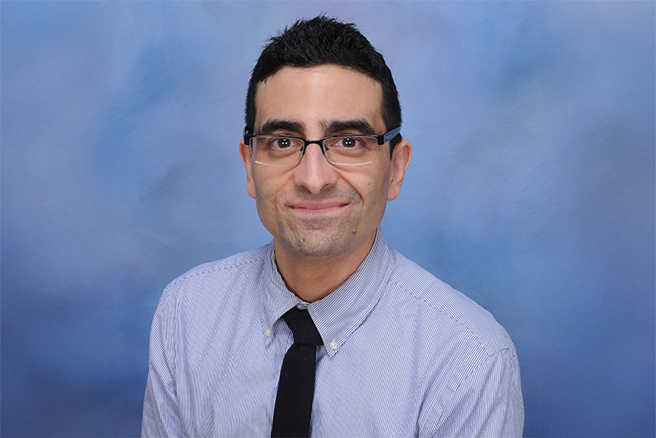Dr. Imran Ali: Reimagining Cancer Care for Older Adults
Dr. Ali, a Mount Sinai physician working full-time at The New Jewish Home’s Manhattan campus, is on a mission to change the way older adults with cancer are treated.
The New Jewish Home and Dr. Imran Ali share the same mission and vision: to provide older adults with the best possible care while fighting ageism, which can affect the treatment they receive.
According to Dr. Ali, who has a special interest is geriatric oncology, decisions about how to treat older adults with cancer are often made based primarily on the age of the patient. “Some patients are indeed frail, but some are robust,” he said.
Dr. Ali treats both long-term and sub-acute patients with cancer. He consults with the oncologists who create patients’ treatment plans, manages their side effects from chemotherapy, works closely with patients to set their goals, and shares those goals with their family members.
His own approach involves customizing treatment to each patient’s individual priorities and condition. When he meets a new patient, he begins by understanding what their goals are. Knowing what they want most will guide the course of treatment he recommends.
Dr. Ali spoke of a patient whose cancer had spread and who was advised to do more chemo. “She told me that before she dies, she wanted to go to Jamaica to see her relatives,” Dr. Ali recalled. “We tailored her treatment to her goals. I said, “Let’s get rid of infusion chemo and move her to an oral dose. Her lifespan will be shorter, but she won’t be debilitated and tied to the infusion center. I worked with her physical therapists to get her into a wheelchair so she could fly to Jamaica.”
Another patient had metastatic melanoma. “She was a feisty 92-year-old—92 on paper, but you couldn’t tell. It’s so depressing to see people judged by an arbitrary number.” Because of her age, her oncologist was advising against treatment that would improve her quality of life. Dr. Ali calculated her frailty scientifically and made the case that she could tolerate chemotherapy. “I had to fight hard for her to get treatment she needed, but she got it and did well.”
Among the tools he uses to ensure that his patients receive treatment that is right for them is one he created himself: the frailty index. Its name can be deceiving—in addition to assessing frailty, this index also helps doctors identify patients who are stronger than their age suggests.
The index is designed to help doctors make informed recommendations on treating older cancer patients. “It’s a head-to-toe assessment of areas of functional ability,” he said. “Since I’ve done these assessments, I’m better able to advocate for my patients. In several cases, I’ve been able to prove to the oncologists that you can give older patients chemo, perhaps a reduced dose, instead of denying them treatment.”
On the other hand, he said, “there are some cases when I agree with the oncologists after completing the frailty survey.” If a patient isn’t strong enough to tolerate chemotherapy, it can damage their quality of life.
Dr. Ali, an assistant professor in the Department of Medicine at the Icahn School of Medicine at Mount Sinai, works full-time at The New Jewish Home, Manhattan. He also collaborates with the Geriatrics department at Icahn School of Medicine at Mount Sinai by teaching rotating geriatric fellows.
He discovered his passion for caring for and advocating for older adults with cancer during his last year of residency, when he was at a crossroads between geriatrics and oncology. He then met Dr. Arti Hurria, a pioneer in the field of geriatric oncology, who became his mentor. “She took me under her wing,” he said. “She told me I’d have more impact in geriatric support of oncology.” After fellowships at University of Connecticut and the Icahn School of Medicine at Mount Sinai, Dr. Ali has found at The New Jewish Home a place where he can focus on the unique needs and challenges faced by older adults diagnosed with cancer.
Many treatments for cancer have never been tested on older patients, Dr. Ali said. In an op-ed for Global Health Reporting Center, he wrote, “Even in this day and age, many older adults are excluded from clinical trials. This means that…the doses are being used without data on how they may affect the aging body…Sometimes, a lack of research leads to unnecessary or even harmful care…The opposite is also true. Where no data exists on how a treatment works in an older adult, treatment may be abandoned altogether.”
In addition to caring for his own patients, Dr. Ali fights ageism in medicine through his work in medical journalism. He appears frequently on ABC News and other media outlets, speaking out about issues that affect older adults. He also advocates at the local, state, and federal levels.
“I find it very rewarding to care for cancer patients,” he said. At The New Jewish Home, he has found a place where his approach is embraced and supported. “I’m able to really see geriatric patient care in a new light. The medical team here at The New Jewish Home is so dedicated—they live the mission, that’s why I love working with them.”

